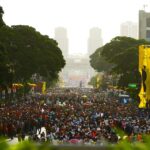
David Paravisini, a Venezuelan expert in public energy policies, stated this Monday, March 22, that PDVSA workers have managed to recover refining capacity in 10% of the national industry.
“The production should be close to 80 or 100 thousand barrels,” he said recently in an interview on the show A Tiempo on Unión Radio.
Regarding the completion of the setup at El Palito refinery, Paravisini explained that “once the major maintenance is finished with a total repair, everything will be good as new and finished by April. 100 thousand barrels of net production will be added, putting 80 thousand barrels a day on the [surplus] market.”
RELATED CONTENT: Venezuelan Diesel Supply to Increase in 72 Hours: Oil Union Leader
#AUDIO | #EduardoRodríguez conversa con David Paravisini en #ATIEMPO #22Mar https://t.co/YCeEoyHe8B
— Audioteca Venezuela (@audiotecavzla) March 22, 2021
He recalled that in 2014 the country imported $40 billion in gasoline and light crude for oil production in the Orinoco Belt because the refineries stopped producing:
“In February 2020, President Nicolás Maduro had to pass a decree by which the oil industry was intervened in for the first time, declaring… a state of emergency in energy and creating the Alí Rodríguez Araque Commission.
RELATED CONTENT: What Happened to Diesel in Venezuela?
“On the other hand, creating by decree the general staff of the productive councils of the workers in order to have the mechanisms to recover refining capacity.”
Paravisini explained that with these changes the oil refining projects produced by the workers and not by the PDVSA management were promoted “without passing through corruption, the mafias, or the sabotage that within PDVSA’s corporate structure prevented any development from taking place, not only from refineries but from our oil industry.”
He believes that before these new guidelines “a dormant force of workers was reactivated to take the direction of this new way of producing that is yielding its results” because “not a single barrel of gasoline was produced in Venezuela—all gasoline was imported, in a situation of war declared by the United States against our country—and that made us particularly fragile in the face of sanctions and coercive measures. Gasoline was prevented from being imported and we ran out of gasoline.”
Featured image: PDVSA working class labors to recover refineries (Photo: PDVSA) .
Translation: Orinoco Tribune
OT/JRE/SL
| Website





